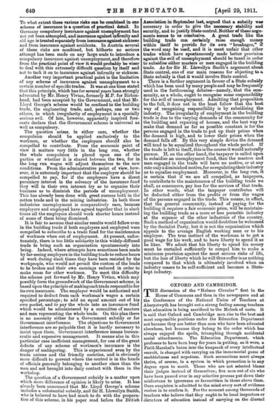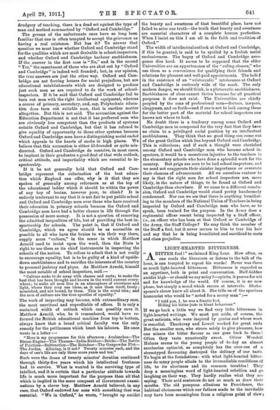OXFORD AND CAMBRIDGE.
THE discussion of the "Holmes Circular" first in the House of Commons and then in the newspapers and at the Conference of the National Union of Teachers at Aberystwyth has brought out a strong feeling among teachers that education is being sacrificed to the Moloch of caste. It is said that Oxford and Cambridge men rise to the best and most responsible positions under the Education Department not because they are better than men who have been educated elsewhere, but because they belong to the order which has always enjoyed the spoils, triumphing through accidental social attachments. The Education Department, which professes to have been busy for years in putting, as it were, a Field-Marshal's baton into the knapsack of every intellectual recruit, is charged with carrying on the immemorial game of snobbishness and nepotism. Such accusations must always thrive, of course, in a system in which promotion is in any degree open to merit. Those who are not selected blame their judges instead of themselves ; five men out of six who have been passed over in any selective process put down their misfortune to ignorance or favouritism in those above them. Once suspicion is admitted to the mind every sort of evidence rushes in to confirm it. For the moment among thousands of teachers who believe that they ought to be local inspectors or directors of education instead of carrying on the diurnal
drudgery of teaching, there is a dead set against the type of man and method summarized by "Oxford and Cambridge." The groans of the unfortunate ones have so long been familiar that one is often tempted to accept the grievance as having a real existence. But has it? To answer that question we must know whether Oxford and Cambridge stand for the qualities which are most desirable in school-inspectors, and whether Oxford and Cambridge harbour snobbishness. If the answer in the first case is "No," and in the second " Yes," the resentment of those who are shut out by " Oxford and Cambridge" is indeed well founded; but, in our opinion, the true answers are just the other way. Oxford and Cam- bridge are not forcing houses for social prejudices, but are educational establishments which are designed to produce just such men as are required to do the work of school- inspectors. If it be said that Oxford and Cambridge fail to turn out men with the right intellectual equipment, whereas a course of primary, secondary, and, say, Polytechnic educa- tion does turn out suitable men, that is another matter altogether. But this is not said. The accusation against the Education Department is not that it has preferred men who are obviously less competent than the products of systems outside .Oxford and Cambridge, but that it has refused to give equality of opportunity to those other systems because Oxford and Cambridge men have a distinguishing social cachet which appeals to the hearts of snobs in high places. We believe that this accusation is either ill-founded or quite mis- directed. Oxford and Cambridge do contrive, in most cases, to implant in their graduates a good deal of that wide outlook, critical attitude, and impartiality which are essential to in- spectorship.
If it be not generally held that Oxford and Cam- bridge represent the culmination of the best educa-
tion which England can offer, why is it that they are spoken of generally among reformers as at the top of the educational ladder which it should be within the power of any boy of brains, however poor, to climb ? It is entirely irrelevant to say that it is not fair to put public school
and Oxford and Cambridge men over those who have received their education in primary schools because the Oxford and Cambridge men have had a better chance in life through the possession of more money. It is not a question of removing the admitted inequalities of life, but of providing the best in- spectorship for schools. The point is, that if Oxford and Cambridge, which we agree should be as accessible as
possible to all who have the brains to win their way there, supply more "culture," in the sense in which Matthew Arnold used to insist upon the word, then the State is right to use them as its chief instruments in inspecting the schools of the nation. To refuse to admit that is not really
to encourage equality, but is to be guilty of a kind of upside- down snobbishness and to sacrifice the interests of the country to personal jealousy and pique. As Matthew Arnold, himself the most notable of school inspectors, said:-
" Culture seeks to do away with classes and sects; to make the best that has been thought and known in the world current every- where ; to make all men live in an atmosphere of sweetness and light, where they may use ideas, as it uses them itself, freely ; nourished, and not bound, by them. This is the social idea ; and the men of culture are the true apostles of equality."
The work of inspecting may become, with extraordinary ease, the most uncritical and unprofitable of offices. It is only a sustained width of outlook which can possibly save it. Matthew Arnold, who, be it remembered, would have re- formed the British educational machine from top to bottom,
always knew that a broad critical faculty was the only remedy for the pettinesses which beset his labours. He once
wrote in a letter :-
"Here is my programme for this afternoon : Avalanches—The Steam-Engine—The Thames—India-Rubber—Bricks—The Battle of Poictiers—Subtraction—The Reindeer—The Gunpowder Plot— The Jordan. Alluring, is it not? Twenty minutes each, and the days of one's life are only three score years and ten."
Such were the doses of twenty minutes' duration continued through thirty-five years which his intellectual freshness had to survive. What is wanted is the surviving type of intellect, and it is certain that a particular attitude towards life is much more important for the purpose than all that which is implied in the mere conquest of Government exami- nations by a clever boy. Matthew Arnold believed, in any
case, that Oxford endowed her sons with something that was essential. "We in Oxford," he wrote, "brought up amidst the beauty and sweetness of that beautiful place, have not failed to seize one truth—the truth that beauty and sweetness are essential characters of a complete human perfection. When I insist on this I am all in the faith and tradition of Oxford."
The width of intellectual outlook at Oxford and Cambridge, if this be granted, is said to be spoiled by a foolish social exclusiveness. The bogey of Oxford and Cambridge arro- gance dies hard. It seems to be supposed that the older Universities are an appurtenance of the " ruling classes," who use them as a convenience for qualifying their friends and relations for pleasant and well-paid appointments. The belief in the existence of an "aristocratic " intolerance at Oxford and Cambridge is curiously wide of the mark. The only modern danger, we should think, is a plutocratic snobbishness. Snobbishness of class cannot thrive because for all practical purposes it does not exist. The Universities are chiefly peopled by the sons of professional men—doctors, lawyers, clergymen, and so forth—and if one is not to look among these for the better part of the material for school inspectors one knows not where to look.
No doubt there is a tendency among some Oxford and Cambridge men to compound for the very fact that they have no claim to a privileged social position by an intellectual snobbishness. They think that no good thing can come out of the great Galilee which lies beyond Oxford and Cambridge. This is ridiculous ; and if such a thought were cherished among Oxford and Cambridge men who became school in- spectors, it would be a monstrous injustice to the teachers in the elementary schools who have done a splendid work for the country. But prigs are sure to be bad school-inspectors, and we need not exaggerate their sinister importance or overstate their chances of advancement. All we ourselves venture to say is that the right men for school inspectors are, more likely, in the nature of things, to be found at Oxford and Cambridge than elsewhere. If we came to a different conclu- sion, Oxford and Cambridge would stand pretty handsomely condemned. Nor can we see that there is anything humiliat- ing to the members of the National Union of Teachers in being inspected by Oxford and Cambridge men who have, so to speak, been trained for the purpose. In the Army does a regimental officer resent being inspected by a Staff officer, i.e., an officer who has been at that Oxford or Cambridge of the Army, the Staff College ? He may think the member of the Staff a fool, but it never occurs to him to tear his hair and say that he is being humiliated and sacrificed to caste and class prejudice.



























































 Previous page
Previous page